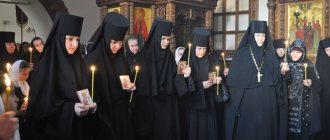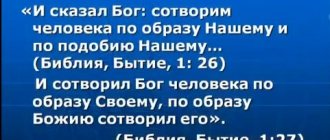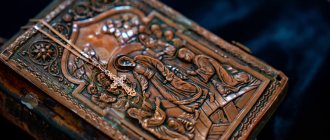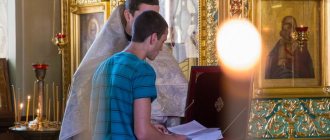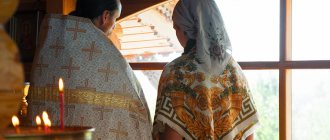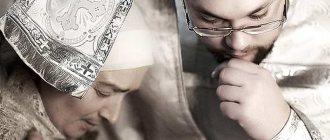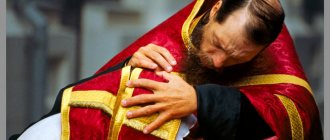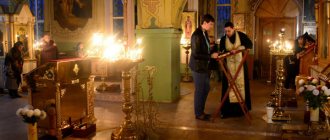CONFESSIONAL
[spiritual father; Greek πνευματικὸς πατήρ], in Orthodox. The church is a priest or elder monk (in ancient times, often without consecration, but with spiritual authority), who regularly receives secret confession and helps the spiritual child on the path to salvation with prayer and advice.
Although D. in the proper sense of the word appeared in the monastic environment in the 4th century, the origins of clergy go back to the apostolic era. Yes, app. Paul, using the image of a father’s relationship with his children, says, addressing the Corinthian Christians: “... although you have thousands of instructors in Christ, but not many fathers, I have begotten you in Christ Jesus through the gospel” (1 Cor 4:15; cf. Gal. 4. 19). He emphasizes his special concern for St. Timothy, calling him his son in the Lord (1 Cor 4:17; cf. Phil 2:22; 1 Tim 1:18; 2 Tim 2:1). The fact that this was a widespread custom among the first Christians is indicated by the texts of the Epistles of other apostles (see, for example: 1 Peter 5.13; 1 John 5.21). In contrast to subsequent eras, the basis for this kind of relationship was not so much the practice of regular confession (the New Testament texts say almost nothing about the nature of this), but rather the participation of the “father” in the conversion of the “son” to Christ, in his baptism and constant guidance in paths of faith.
The expression πνευματικὸς πατήρ is first found in an apocryphal work - Greek. The Apocalypse of Baruch - and clearly refers to Christ. priesthood (Apoc. Bar. 13.4). However, due to the uncertainty of the date of writing and possible interpolations, this text cannot serve as reliable evidence of the emergence of the institution of D. At the same time, already in the 3rd century. There were indications of the existence, in addition to canonical discipline, which implied public confession with the participation of the community, of the practice of secret confession before a bishop or presbyter (although it is impossible to draw clear conclusions about its sacramental nature). Yes, sschmch. Methodius, bishop Patarsky, interpreting the book. Leviticus, spoke of the need to regularly “show spiritual leprosy to the priests” (Method. Olymp. De lepra. X 3 (67)), so that in case of committing a sin, the matter would not lead to public confession and excommunication for a long period. In the “Apostolic Constitutions” (late 4th century), bishops are called “spiritual fathers” (Const. Ap. 2.33), and the emphasis, as in the NT, is not on receiving confession, but on baptism, instruction in the faith and etc. In general, in the 4th century. The expression “spiritual father” was used quite widely. For example, St. Basil the Great, addressing St. Athanasius I the Great, called him spiritual father (Basil. Magn. Ep. 82 (78)); at the same time, he also called the prophet the same way. David (Idem. Hom. in Ps. 33. 12).
According to the writings of church historians of the 5th century. it is known that in cathedral churches there was the position of presbyter “over the penitents” (ὁ ἐπ τῆς μετανοας) (Socr. Schol. Hist. eccl. V 19; Sozom. Hist. eccl. VII 16), but the scope of his powers and the nature of his service are not exactly known . Although a number of scientists (A.I. Almazov, A.S. Pavlov) tried to completely identify these presbyters with D., sources of the pre-iconoclastic era do not confirm this theory (nowhere are presbyters called D.). According to N. S. Suvorov, in the era of the Ecumenical Councils of D. there were only elder monks (Suvorov. 1906. P. 53-54). However, as the research of S.I. Smirnov showed, on the one hand, the practice of secret confession (with which clergy began to be identified in this era) existed in the world, although it was not as widespread as in the monastic environment (Basil. Magn. In Isaiam proph. 10. 19; Ioan. Chrysost. De Lazaro. 4); on the other hand, confession among the elders differed from the sacramental one, since it was based not on the grace of the priesthood, but on the personal grace-filled gifts of ascetics (Smirnov. 1906). In addition, the basic principles of pastoral service and D.’s treatment of his children, on which later. all D. were oriented, were formulated by the fathers who served in the world (see: “Rules, extensively stated” and “Rules, briefly stated” by St. Basil the Great, “On the Priesthood” by St. John Chrysostom, etc.; expanded in the monastic environment D.’s instruction was left by St. John Climacus - “A Word to the Shepherd” in the appendix to the “Ladder”).
Nevertheless, the term “spiritual father” in the pre-iconoclastic era was used by ch. arr. to the elder monks (if in the corpus of literature associated with the name of St. Pachomius the Great, it has not yet been used, the names for D. there are “abba”, “elder”, “father”, then already in the Apophthegmata Patrum this name has become common). The canonical rules of the era of the Ecumenical Councils speak of “those who have the power to bind and loosen” (cf. Matthew 18:18; John 20:22-23), but not about D.
The main difference between D. and other monks was the gift of discerning spirits (sometimes in combination with the gift of clairvoyance). To the elders in the desert already in the 4th century. laymen and even clergy from the cities begin to come. Probably, for a long time this practice was not approved by all hierarchs (due to the discord associated with dogmatic disputes). But already in the 7th century. St. Anastasius Sinaite spoke about the benefits of guidance from a “spiritual husband” (meaning an elder monk) for the laity and defended confession before “holy people” (Anast. Sin. Quaest. 6 // PG. 89. Col. 370-375).
In monastic literature, the principle of unquestioning submission and entrusting oneself to D. was carried out. The transition from one D. to another was not encouraged and was considered permissible only with D.’s permission or in the event of his serious illness or death. D. could, at his own discretion, impose penance and not allow the flock to receive Communion of the Holy Mysteries. It was customary to ask D. for a blessing for especially important matters. Unauthorized acceptance of ascetic deeds without D.'s permission was condemned. The desire of the laity to gain D., without renouncing the world, created a situation where the implementation of these rules in full became difficult. Therefore, parish priests also began to perform the functions of D.
The decisive role in the widespread dissemination of the practice of clergy was played by the strengthening of the influence of monasticism in church life during the iconoclastic era and the final disappearance of public penitential discipline. An outward manifestation of this was the spread in parish churches of the practice of imposing penances according to the monastic model. The rules according to which the Crimea were imposed were collected in special books: Nomocanons, Canonaries or Penances (analogue in the West - Penitentials). The earliest version of such a Nomocanon has been preserved under the name of St. John IV the Faster, Patriarch of Poland. The author of this collection recommends that D. treat the repentant as a friend, console him, and after confession lay his hand on his neck with the words: “Let all these sins of yours be upon me, son, and I will answer for them to our Lord Jesus Christ, and you will be clean from everything, if only you have repentance and obedience, and from now on you will direct your life with fear and repentance before the Lord” (Zaozersky N.A., Khakhanov A.S. Nomocanon of John the Faster in its editions: Georgian, Greek . and Slav. M., 1902. P. 75). In manuscripts containing the rites of confession and questions to those confessing, D., who receives confession, is often called ἀναδεχόμενος, δεχόμενος (receiver) or ἀνάδοχος (receiver) as not only hearing the confession, but also taking upon himself the sins of the penitent. In the "Rules" of St. Nikephoros I, Patriarch of K-Poland, says that D. should show special attention to the laity who confess of their own free will (Nich. Isp. 30).
It was customary for the Studite monks to come to the abbot every day to reveal their thoughts (Leroy J. La vie quotidienne du moine studite // Irénikon. 1954. Vol. 27. P. 33). In women Mon-ryakh the situation was more complicated. Thus, according to the Typicon of the Monastery of the Mother of God Kekharitomeni, the abbess, although she was called μήτηρ πνευματική (spiritual mother), did not accept confession; all the sisters had to confess to one priest, who came alone or several. once a month and had to be a eunuch (Gautier P. Le typikon de la Théotokos Kécharitôménè // REB. 1985. Vol. 43. P. 53 (600), 59 (721-726); cf. practice described in the Typikon of the monastery Lips (chapters 11-13), - Delehaye H. Deux typica byzantins de l'époque des Paléologues. Brussels, 1921. P. 106-136).
In the late Byzantine period. era, much attention is paid to spiritual leadership in the works of St. Simeon the New Theologian, who greatly revered his D. - St. Simeon the Studite (Reverent), constantly thanking God for giving him such a D. (Sym. N. Theol. Euch. 1. 19-25). According to the monk, Christ Himself shows the sinner D. (Ibid. 2. 52-75). To find D., you need to pray, and not look for famous monks (Ibid. 7. 399-405): as in ancient times, “God reveals the apostles, prophets and righteous ones to those who show zeal and take care of themselves and contribute their effort and does good” (Idem. Ep. 3. 262-266). True D. will not want to be saved without his spiritual children (Idem. Catech. 8). D. is the apostle (Idem. Euch. 2.129) and the new Moses (Idem. Hymn. 18. 124-221; cf.: Ioan. Climacus. Ad pastor. 15. 1). St. Simeon called to imitate D., who shows the child the image of Christ (Sym. N. Theol. Catech. 20). However, such veneration of D. caused condemnation from the K-Polish Patriarch.
In the late Byzantine period. era D. were among many. emperors (for example, Emperor Alexei I Comninus D. had monk Ioannikios, who accompanied him everywhere and carried out various assignments (Ann. Comn. Alex. I 7. 5, 8. 2, 9. 3).
In modern Greek Churches and monasteries retain the practice of elder confession, and in D. parishes there can only be a priest who has a special ordination from the bishop. In the “Archieratikon” there is a rite for the installation of D. (τάξις ϒενομένη εἰς τὸ ποιεῖσθαι Πνευματικὸν), consisting of the usual beginning, prayer: Κύριε ᾿ Ιησοῦ Χριστέ, ὁ Θεὸς ἡμῶν, ὁ τῷ Πέτρῳ... (Lord Jesus Christ, our God, Peter...), Gospel reading (John 20. 19-23) and the final blessing (with the words: “By the grace of the All-Holy and Law-giving Spirit, (name) is guaranteed to be a confessor”) (᾿Αρχιερατικόν. Σ. 152-153). D.'s instructions are summarized by St. Nicodemus Svyatogorets (᾿Εξομολοϒητάριον. Βενετια, 1885).
In Rus', D. have been known at least since the 11th century. (St. Theodosius of Pechersk). In the Russian Church it has always been believed that the functions of D. can be performed by any parish priest (probably due to the constant shortage of clergy). At the same time, many wanted to have D. monks, especially the widely revered elders. Known D. rus. princes, for example St. Savva Storozhevsky was D. Yuri Dimitrievich, Prince. Zvenigorodsky, and St. Kirill Belozersky - D. Andrei Dimitrievich, book. Mozhaisky. In pre-Petrine times, D. was chosen freely. In the book. “Son of the Church”, one of the first Russian. Catechisms (17th century), which were widespread, especially among the Old Believers, say: “If you do not have a spiritual father, choose and call him, and do not live without him. For it is written in our Christian law: whoever lives in the world and does not have a spiritual father is not a Christian. And one more thing: woe to that person living in the world if he dies without a spiritual father. It would have been better for him not to have been born” (Son of the Church. 80. About the Spiritual Father. L. 37-37 vol.). “If you have sinned or sinned in something before God and come to your spiritual father and confess, he will be your intercessor to God and will loosen the sins that bind you. And without it no one [himself] can be freed from sins. Even if you are going to do good deeds, [first] be blessed by him, as if accepting a letter and seal from the king and taking up arms” (Ibid. 82. On the remission of sins. L. 38 vol. - 39). In addition to confession, D. took part in arranging the marriage, teaching the flock, drawing up a will and funeral service (see: Smirnov. 1899). Later, D.'s testimony was accepted as the most important in civil and criminal cases.
Schism in the Russian Church of the 17th century. became the reason that D.'s position and attitude towards them, primarily from secular and church authorities, began to change. To prevent a repetition of the situation with Archpriest Avvakum, who was a famous D., who had many. spiritual children, in the era of Peter I, a policy was pursued of attaching Christians to parishes and limiting their ability to freely choose D. According to the Addendum to the “Spiritual Regulations” “On the Rules of the Church Clergy and the Order of Monasticism” (1722), parish priests had to keep records of those who confessed to them, therefore the parish priests who took confession from the parishioners began to be called D. But in the Russian Church the eldership did not disappear. Its revival was associated with the activities of St. Paisiya (Velichkovsky). In the 19th century Optina Makarieva was famous for its numerous elders in honor of the Entry into the Temple of the Most Holy. Mother of God husband empty The elders were such great Russians. ascetics, like St. Seraphim of Sarov, St. Ignatius (Brianchaninov), St. right John of Kronstadt. During the years of Soviet power, many the elders, as well as the parish priests who performed the duties of D., became confessors and accepted martyrdom. In the 2nd half. XX century famous D. who served in monasteries or in the world and left written instructions to their children were abbots. Nikon (Vorobiev), Rev. Vsevolod Shpiller, archimandrite. John (Krestyankin) and others.
Lit.: Holl K. Enthusiasmus un Bussgewalt beim griechischen Mönchtum. Lpz., 1898; Smirnov S.I. Old Russian confessor. Serg. P., 1899; aka. Spiritual father in the ancient Eastern Church: History of clergy in the East. Serg. P., 1906. Part 1: The period of the Ecumenical Councils; Suvorov N.S. On the issue of secret confession and confessors in the Eastern Church. M., 19062; Hausherr I. Direction spirituelle en Orient autrefois. R., 1955. P. 212. (OCA; 144); Rossum J., van. Priesthood and Confession in St. Symeon the New Theologian // SVTQ. 1976. Vol. 20. P. 220-228.
A. A. Tkachenko
Sermon
Blessed Diadochos said: “There is nothing more meager and poor than a mind philosophizing about God, which itself is outside of God.”
A sermon, a lecture, a story about spiritual things is boring when a person says something that he does not know from experience. You say Christianity is joy. But how can I believe you if I don’t see the transforming joy on your face? Both the experience of the preacher’s struggle and the experience of his victory are important to me. I can read about God myself, but I want to hear what the Creator did in the life of the one who tells me about Him. How was their relationship? Where did you start? How did he overcome dissatisfaction with God and distrust of Him? How does he feel the Almighty and does he always feel it?
The retelling of books cannot replace the personal experience of transformation and communication with God, therefore a person should talk about God only what is his personal experience of meeting and communication.
Not only the experience of victories is important to me, but also the experience of failure, defeat, which did not stop the movement of the soul into the light.
A person, of course, does not immediately conquer passion, but as he struggles, he can teach me.
A person can talk about what he lives by and what lives in him.
The power of faith is God, but so is God's man. During the lectures it became clear why the Apostle Paul calls the word of God a sword of the Spirit... Indeed, it was a sword that penetrates to the separation of soul and spirit. But in order for the sword to be effective, a person who knows how to wield it is needed, someone who can be called a spiritual person. Without this condition, even the best sword is useless, because we are all convinced not by words, but by some ineffable light emanating from the face and heart of the one who speaks these words.
Confessor
A hieromonk of an honest and God-pleasing life, gifted by God with spiritual reasoning and diligent in reading the Word of God and the patristic writings, is appointed to the position of Spiritual Father of the monastery at the age of perfection. The responsibility of the Confessor is to perform the Sacrament of Repentance and to provide spiritual guidance to the brethren along the path to salvation. The confessor must keep a record of who and when received the Holy Mysteries of Christ, so that everyone can steadily approach this great sacrament. Also, the Spiritual Father is obliged, in accordance with his indispensable duty, to visit the sick, comforting and encouraging them in mental and physical illnesses.
If the confessor, due to the multitude of brethren or due to weakness, does not have time to receive all of his spiritual pupils, then with the permission of the abbot, some of them are given to an experienced spiritual elder, but the confessor is responsible for the correctness of the spiritual guidance on the part of the elder.
In addition, with the blessing of the Abbot, other hieromonks or simple monks experienced in spiritual life, who are subordinate to the main confessor of the monastery, receiving fatherly advice and instructions from him, can be appointed as elders or mentors over new monks.
In addition to the elders-mentors, the monastery confessor is subordinate to the confessor-hieromonks who confess to the pilgrims, among whom one may be senior and responsible for the common task of confessing the fasting people. In the great, responsible and difficult task of spiritual leadership, the confessor is guided by the Word of God, the wise patristic writings, the rules of the Holy Church and the rules laid down in the Charter of the monastery. In perplexed matters, the Confessor asks the Superior and follows his judgment and will.”
From the Charter of the Holy Trinity Alexander Svirsky Monastery
Important thoughts about clergy
The holy righteous Alexy Mechev says: “If you leave your spiritual father with despondency, with melancholy, with an even greater burden than you came to him, if he causes you suffering, and this suffering drags you to the ground, and you do not receive relief - beware such a father!..
This is a sure sign of your true spiritual father, who can guide you: if you leave him relieved, your soul is, as it were, raised above the ground, you feel new strength, peace, joy, light, love for everyone, with the desire to work on yourself, to serve Christ - know that this is your true spiritual father.”
Elder John Krestyankin talks about the relationship between student and teacher: “No one can solve our vital issues for us, and even in former times the elders did not command the inheritance of God. The person himself must think about what to take the blessing for.”
The same idea is developed by Father Valerian Krechetov: “But in order for the Lord to intervene, it is necessary that the person himself strives for the truth. And the desire for truth presupposes that a person learns to think. Father Alexey Mechev, for example, often asked his children: “What do you think?” With his question, he taught a person to reason for himself. Father Vsevolod Shpiller said: obedience is not asking: “Bless me to open the window, bless me to close the window.” In life, such “novices” are often found. But if everyone asks things like that, you’ll go crazy, and it won’t do any good. Obedience presupposes independence, responsibility, and courage in a person.
A blessing is not a command, because a command is already a dictatorship. And in a dictatorship there is no love. And love and freedom are inextricably linked. The basis here is the love of God, and in response to it is the free love of man.”
Saint Silouan of Athos: “We must always remember that the confessor performs his ministry in the Holy Spirit, and therefore we must revere him. Believe, brothers, that if someone happens to die with a confessor and the dying person says to the confessor: “Holy Father, bless me to see the Lord in the Kingdom of Heaven.” And the confessor will say: “Go, child, and see the Lord”; it will be with the blessing of his confessor, because the Holy Spirit is the same in heaven and on earth.”

